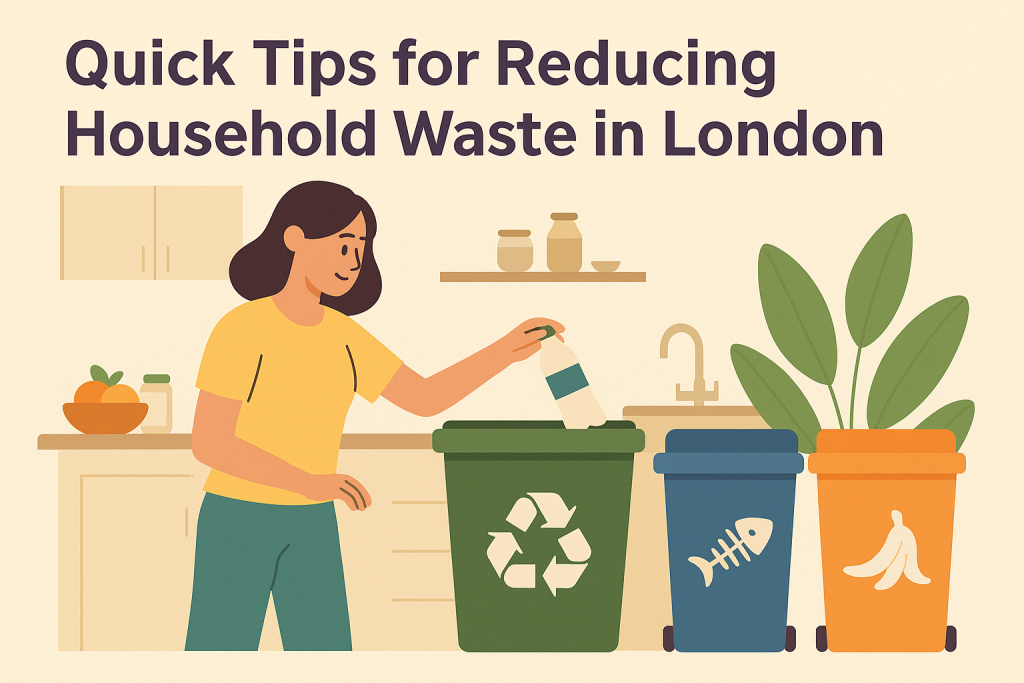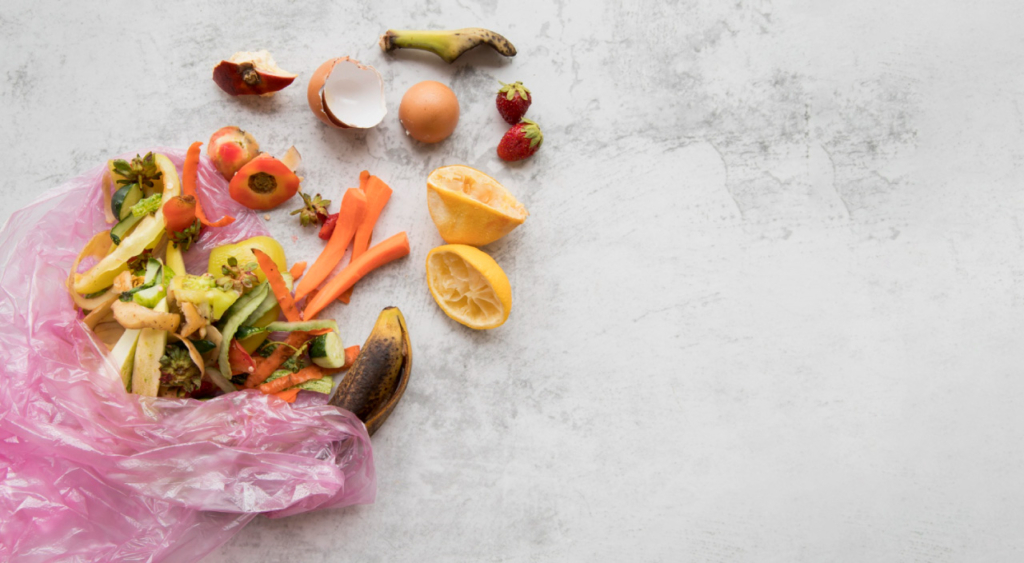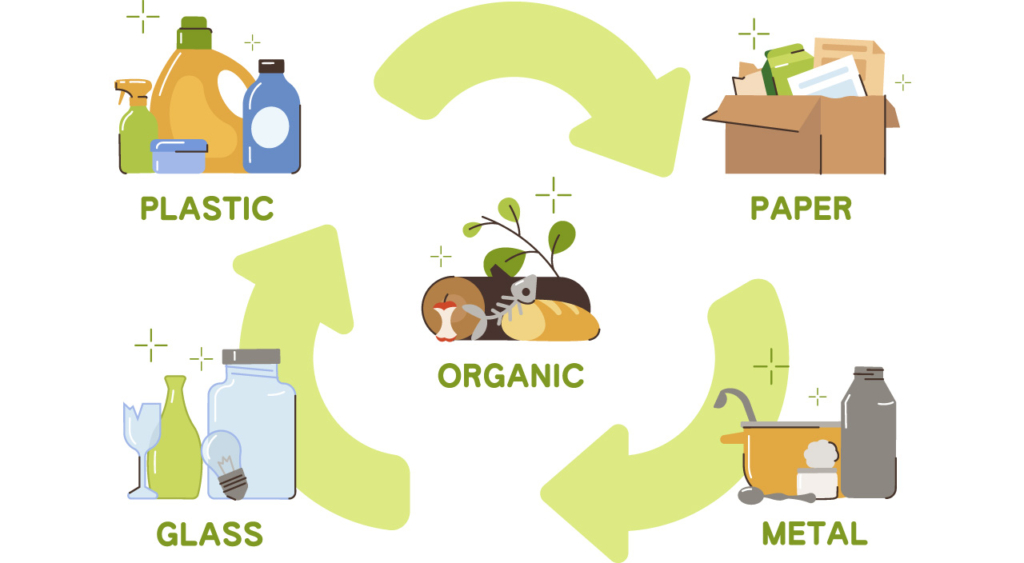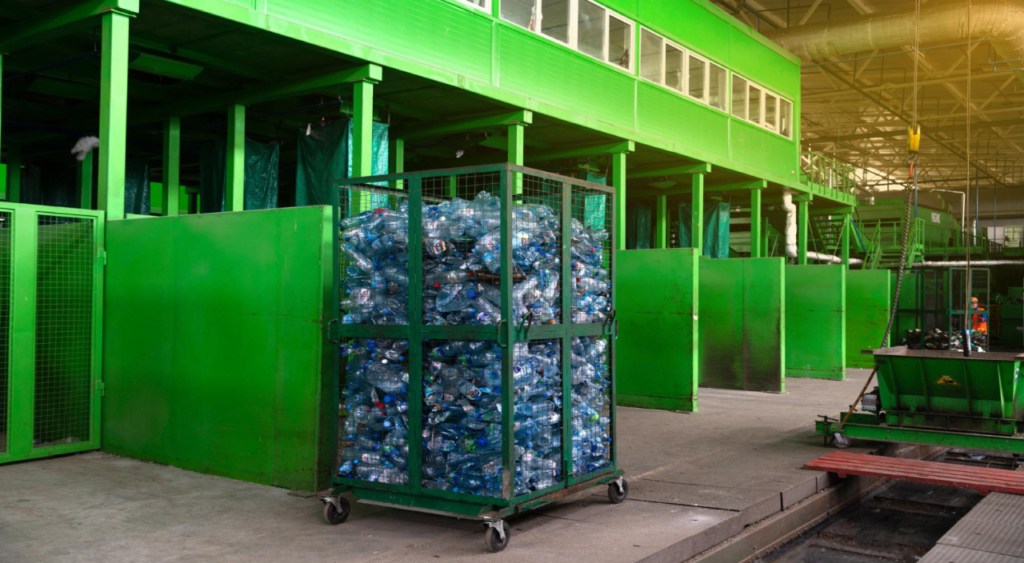
Key Takeaways
- Recycle correctly using borough-specific guidelines to avoid contamination.
- Plan meals to cut food waste and save up to £700 a year per household.
- Use reusable containers and bags to reduce single-use plastics instantly.
- Join local swap groups to reuse items instead of throwing them away.
- Track waste with apps like Too Good To Go to donate or share surplus food.
Understanding London’s Household Waste Challenge
 London’s homes produce over 2.3 million tonnes of waste each year. This number has been growing since 2019. To tackle this, we need to understand the problem better. Current Waste Statistics in London Here are some key facts from 2023:
London’s homes produce over 2.3 million tonnes of waste each year. This number has been growing since 2019. To tackle this, we need to understand the problem better. Current Waste Statistics in London Here are some key facts from 2023:
- Every household in London throws away about 400kg of waste each year.
- Only 34% of waste is recycled consistently.
- Food and plastic waste account for 40% of landfill waste.
The Environmental Impact of Excessive Waste The waste we throw away has serious effects:
- Landfills release methane, a gas that’s 25 times worse than CO2.
- Every year, 200,000 tonnes of recyclables are burned instead of being recycled.
- Getting new items for things we can replace contributes to 15% of London’s carbon emissions.
London’s Waste Management Goals The Mayor has set ambitious targets for 2024:
- By 2025, aim for 65% recycling in each borough.
- By 2026, expand food waste collection to 80% of homes.
- Reduce single-use plastics by 30% through education.
These goals show London’s commitment to reducing waste. Making small changes at home can help a lot. Smart Shopping Habits to Minimise Waste Changing how we shop can greatly reduce waste. Start by using reusable bags and containers. This way, you can avoid single-use plastics.
- Visit stores like The Refill in Islington or Earthbox in Hackney for package-free shopping.
- Buy items in bulk to cut down on packaging. Stores like Waitrose now offer refill stations.
- Refuse plastic bags for loose items. Saying “No thanks, I’ll carry it like this!” helps a lot.
Investing in durable items like stainless steel straws or beeswax wraps may seem expensive at first. But they save money in the long run by reducing the need for frequent replacements. Apps like Too Good To Go help reduce food waste by letting you buy surplus groceries. Even small actions, like asking cafes to skip the wrapper, can make a difference. Together, we can make a big change.
Kitchen Waste Reduction Strategies
 To reduce kitchen waste, start with smart choices. Focus on reducing food waste and composting. These steps can help shrink your waste while fitting into your busy life. Follow these tips to make a real difference.
To reduce kitchen waste, start with smart choices. Focus on reducing food waste and composting. These steps can help shrink your waste while fitting into your busy life. Follow these tips to make a real difference.
Food Storage Solutions
Keep food fresh to reduce waste. Store herbs in glass jars with water, like basil or cilantro. Keep vegetables dry: carrots and apples thrive in breathable bags. Freeze surplus berries or herbs in ice cube trays. Organise fridges with clear zones for dairy, veggies, and meats to prevent spoilage.
Composting in Limited Spaces
Even tiny kitchens can compost. Try bokashi bins for indoor fermentation or wormeries under sinks. London boroughs like Camden and Hackney offer discounted compost bins. Join community schemes-places like Islington’s garden hubs accept food scraps. These methods turn waste into garden feed, cutting landfill contributions.
Meal Planning to Reduce Food Waste
Plan weekly meals to slash food waste. Start with a list based on recipes, like using leftover roast chicken for pies or soups. Freeze portioned leftovers in reusable containers. Apps like Olio connect you with neighbours for surplus groceries. Batch-cook soups or curries to use veggies nearing their best.
Recycling Properly: What Londoners Need to Know
Recycling in London isn’t one-size-fits-all. Every borough has its own rules, but mastering these steps ensures your efforts make a real impact on household waste reduction.
Borough-Specific Recycling Guidelines
 Check what your local council accepts-plastic, glass, or textiles-before you sort. Here’s a snapshot of three boroughs:
Check what your local council accepts-plastic, glass, or textiles-before you sort. Here’s a snapshot of three boroughs:
| Borough | Accepted Items | Details |
| Camden | Plastic bottles, glass, paper | Recycling Hub |
| Wandsworth | Electronics, textiles, garden waste | Waste Management Portal |
| Bromley | Food waste, cardboard, batteries | Recycling Guide |
Common Recycling Mistakes to Avoid
- Leaving food residue on containers-rinse items first
- Placing plastic bags in recycling bins (use carrier drop-offs instead)
- Assuming all plastics are accepted (check labels for codes 1-7)
Finding Local Recycling Centres
- Use the London Recycling Locator tool
- Visit Walthamstow Recycling Centre for bulky items
- Try Hackney’s Reuse Hub for furniture and appliances
Always call ahead to confirm opening times and item restrictions. Small changes like these turn everyday waste management into effective recycling.
Sustainable Furniture Disposal Options in London
Disposing of unwanted furniture responsibly is key to reducing bulky household waste in London. Many items destined for landfills can instead be donated, repaired, or recycled. Start by assessing furniture condition: items in good shape can be donated to charities like British Heart Foundation shops or Emmaus, which offer free collections in most boroughs. Over 70% of donated furniture is reused locally, extending its lifecycle and supporting community projects.
- Donation points: British Heart Foundation, Emmaus, and local reuse centres accept mattresses, sofas, and tables. Search your borough’s website for approved partners.
- Repair options: Check platforms like iFixit or local workshops for DIY guides and repair services. Platforms like Freecycle let you offer items free to others.
- Council collections: Most boroughs offer bulky waste collections for non-repairable items. Contact your local council to book a scheduled pickup.
London’s circular economy initiatives are growing, with startups like LoopFurnish offering remanufactured furniture. Before discarding, consider renting or reselling through apps like Vinted to keep items in use longer. Proper furniture disposal not only cuts landfill contributions but also supports ethical businesses. For sustainable disposal, prioritise reuse over recycling or throwing away.
Effective Household Waste Management Systems
 Managing household waste in London can seem daunting. But, smart systems make it easier. A well-thought-out waste management plan helps families sort waste well and reduces clutter. Here’s how to tailor strategies to your home’s layout.
Managing household waste in London can seem daunting. But, smart systems make it easier. A well-thought-out waste management plan helps families sort waste well and reduces clutter. Here’s how to tailor strategies to your home’s layout.
Setting Up Sorting Stations at Home
Design sorting stations that fit your space. For small flats, use compact bins under sinks or wall-mounted racks for recyclables. Terraced homes might use corner shelves with labeled bins for different waste streams. Try clear containers so contents are visible, or invest in multi-compartment trolleys like IKEA’s RAKETT to group materials neatly. Place stations near where waste is generated, like kitchens or entryways.
- Use colour-coded bins: blue for recyclables, green for compost, and black for general waste.
- Include a small drawer for reusable bags near the front door to collect recyclables on the go.
- Attach magnetic strips to fridge doors for temporary storage of glass or plastic containers awaiting recycling.
Weekly Waste Reduction Routines
Maintaining systems requires routine checks. Spend 10 minutes weekly to prepare for collection days and refine habits:
- Review your borough’s collection schedule online to avoid missed pickups.
- Do a quick audit: inspect bins for items that could be donated, repaired, or reused instead of thrown out.
- Empty and clean bins weekly to prevent odours, using eco-friendly cleaners like Ecover or Method.
House Clearance Services: Eco-Friendly Alternatives
When managing large-scale house clearance, choosing ethical providers ensures household waste is handled responsibly. Londoners can reduce their environmental impact by prioritising companies committed to ethical disposal. Here’s how to make informed choices and understand the journey of your items post-clearance.
Vetting Ethical House Clearance Companies
Ask these questions before hiring:
- What percentage of waste do you divert from landfills?
- Do you partner with local charities or reuse networks?
- Can you provide details on hazardous material handling?
Reputable firms like Clearabee and Donate & Recycle publish recycling rates and donation partnerships online. Avoid services that offer unclear disposal methods-this often signals unsustainable practices.
What Happens to Your Items After Collection
Items follow these paths:
- Recyclables sent to certified facilities for processing.
- Reusable goods distributed to charity shops or repair workshops.
- Hazardous materials handled by licensed specialists.
Transparency is key-ethical providers share destination reports. For instance, 90% of household waste handled by ethical companies avoids landfills, contributing to London’s waste management goals. During life transitions like moves or bereavements, these services offer both practical and eco-conscious solutions.
Office Clearance and Reducing Business Waste
London’s businesses play a key role in tackling waste. Simple changes at work can cut costs and boost sustainability. Start by auditing current streams, like paper, packaging, and electronics. Engage teams with clear goals to drive efforts.
- Set up recycling stations near desks for paper, plastics, and batteries.
- Train staff on proper disposal and track progress monthly.
- Choose suppliers with eco-friendly packaging to cut incoming waste.
When moving or renovating, doesn’t mean landfill. Partner with services that donate furniture to schools or recycle tech responsibly. Shredding services for confidential docs can also be eco-certified.
| Company | Initiative | Result |
| Innocent Drinks (London Office) | Switched to reusable containers and compostable packaging | 50% less waste in two years |
| Barclays’ Canary Wharf HQ | Launched a paperless invoicing system | Avoided 2.5 tonnes of paper annually |
| King’s Cross Sustainable Workspaces | Partnered with TerraCycle for e-waste recycling | 95% of old electronics diverted from landfills |
Small steps like these save money and boost reputation. London’s businesses can lead by example, proving and growth go hand-in-hand.
Digital Solutions to Reduce Paper Waste
Going digital can slash paper waste while simplifying daily tasks. Londoners can cut paper use by adopting digital solutions tailored to city life. From bills to shopping lists, technology offers practical tools to reduce paper waste without sacrificing convenience. Switching to paperless billing is a simple start. Many London services like Thames Water and Transport for London offer online accounts for household waste reduction. Banks such as Barclays and NatWest let customers opt out of paper statements. Concerned about security? Enable two-factor authentication and check for HTTPS on websites. For those without smartphones, libraries provide free internet access to manage accounts safely. Apps streamline waste tracking and recycling. Try these top picks:
- Too Good To Go: Cuts food household waste by connecting users with surplus groceries
- Olio: Shares unused items locally, reducing packaging paper waste
- Recycle Now: A free app with London-specific recycling guidelines
Still using paper calendars? Digital planners like Google Tasks or Apple Notes organise shopping lists and reminders to avoid overbuying. For non-tech users, community hubs like Islington’s Eco Centre offer free app tutorials. Small steps like these add up, proving sustainability and convenience can go hand-in-hand.
Community Initiatives and Sharing Economy
London’s communities are tackling household waste through creative sharing and reuse projects. These efforts turn everyday items into resources, cutting waste while building stronger neighbourhoods. Here’s how to get involved:
London’s Zero-Waste Shops
Stores like Earthzero in Hackney and The Source Bulk Foods in Peckham let shoppers buy groceries package-free. Bring your containers to reduce plastic and food waste. Many locations offer bulk spice aisles and refill stations for cleaning products.
Neighbourhood Swap Events
- Croydon’s Furniture Swap events let residents trade unwanted items like sofas or shelves.
- Camden hosts monthly clothing swaps and tool exchanges.
- Check local council websites for free listings of seasonal swap meetups.
These swaps keep furniture disposal costs down while rescuing usable items from landfills.
Borrowing Schemes for Occasional-Use Items
London’s Brixton Library of Things and similar hubs let you borrow camping gear, projectors, and even baby equipment. Annual memberships start at £15, making it easy to access tools without buying new. Many schemes accept item donations to keep the rotation going. Joining these initiatives not only cuts household waste but also connects you with local groups. From south to north London, these projects prove sharing strengthens communities while protecting the environment.
Conclusion: Creating a Lower-Waste Lifestyle in London
Reducing household waste in London doesn’t require drastic changes overnight. Simple steps like smarter shopping, composting in small spaces, or using borough-specific recycling guidelines can make a big difference. Every action, from choosing zero-waste shops to opting for ethical house clearance services, contributes to a collective effort. Limited space and busy lifestyles needn’t hinder progress. Start with one habit-meal planning cuts food waste, or swapping items with neighbours reduces clutter. These small choices add up when millions of households act together. Apps for waste tracking or local drop-off points make it easier to follow through. London’s unique challenges, from varying recycling rules to dense living, become opportunities to innovate. By supporting eco-friendly house clearance or borrowing tools instead of buying, residents turn everyday routines into sustainability wins. Over time, these efforts cut costs, declutter homes, and strengthen communities. As the city works toward its waste reduction goals, every resident plays a role. Whether through digital billing, reusing items, or championing zero-waste swaps, Londoners can lead the way in urban sustainability. Begin today-pick one tip, then build from there. Small steps today shape a cleaner, greener future for all.